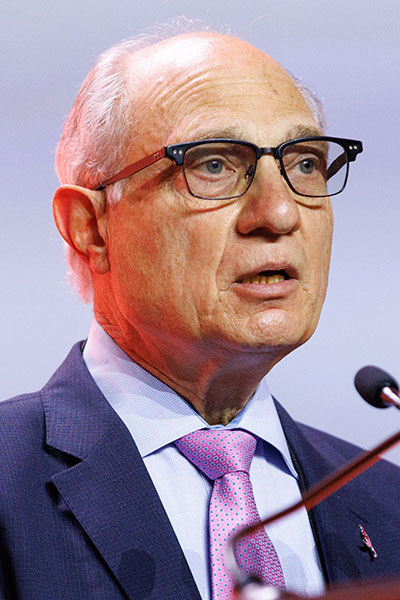
Geoffrey M. Wahl, PhD, Daniel and Martina Lewis Chair and Professor at the Salk Institute for Biological Studies Gene Expression Laboratory, received this year’s Brinker Award for Scientific Distinction in Basic Science on Thursday for his vital research in the field of cancer genetics. Dr. Wahl’s analysis of the mechanisms of drug resistance and genome stability has led to important discoveries across multiple disciplines and created a foundation for future discoveries in breast cancer research and treatments.
Dr. Wahl dedicated this recognition to his many colleagues and collaborators throughout his career. He emphasized the necessity of interdisciplinary alliances and mentorship to further scientific research.
“It’s at the intersection of different fields that the most significant advances come,” Dr. Wahl said.
Early in his career, Dr. Wahl studied mechanisms of resistance to a drug that inhibited thiouridine biosynthesis. He concluded that resistance to inhibitors was mediated by the genesis of abnormal chromosomes that contained extra copies of the genes targeted by the drugs. Similar abnormal structures were also observed in cancers, including breast cancer. Unlike cancer cells, this gene amplification did not occur in normal cells.
“This told me something very important,” Dr. Wahl explained. “It said that the acquisition of genomic instability indicated by gene amplification was something that was under control and that control was violated during cancer progression.”
Over the next decade, Dr. Wahl’s lab searched for the control mechanisms causing the genetic mutations. His group found that chromosome breakage initiates gene amplification. This led Dr. Wahl to wonder what was preventing genomic amplification in normal cells.
“Normal cells have a way of sensing a stress. For example, a break in the chromosome that results in gene amplification. That break activates a guardian, and the guardian prevents cell cycle progression. This will, of course, prevent the emergence of clones with genomically unstable genomes.”
In cancer cells, a mutation occurs to disable this guardian, which enables cell cycle progression despite the presence of chromosome damage. This leads to the emergence of cellular “clones” that manifest genomic instability. He eventually found that the p53 gene fulfilled all the characteristics of the guardian his team was looking for.
Once this discovery was made, Dr. Wahl shifted his focus to studying mechanisms by which p53 was activated. He performed a series of experiments to both deactivate and overexpress p53 to observe how this would affect cellular reprogramming. Eventually, Dr. Wahl hypothesized that cancer cells were reprogrammed to a primitive state.
“In vivo, p53 might act as a guardian against reprogramming to a primitive state by inducing amitosis, or cell cycle arrest, or enforced differentiation in order to prevent cells from reprogramming,” Dr. Wahl said. “On the other hand, when p53 function is aggregated, then what happens is the cells get de-differentiated. The question became ‘what state are they de-differentiating to?’”
Dr. Wahl began studying mouse development at the single-cell level to understand if there was a relationship between cells formed in the embryo and those seen in the most aggressive forms of basal breast cancers. His team found that Sox11-expressing cells were present in mice and human triple-negative breast cancer. According to Dr. Wahl, Sox11 has been widely implicated in tissue repair related to breast cancer, and his lab is currently analyzing its functional importance.
On-Demand Session Availability
Daily sessions will be available for on-demand viewing 3-5 days following the 2022 Symposium (author permitting). They will be available exclusively to registered SABCS attendees until March 2023. Following March 2023, they will be available on SABCS.org under the “Resources” tab.

